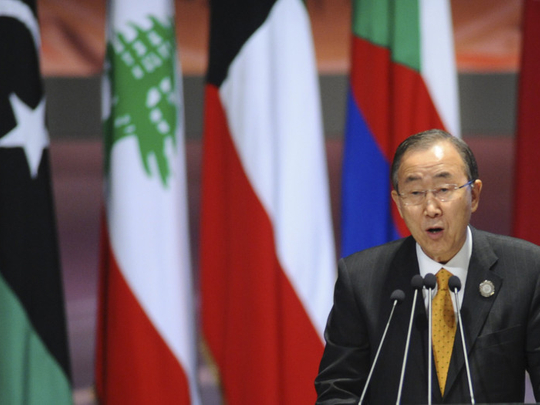
Sharm Al Shaikh: UN Secretary General Ban Ki-moon said on Saturday he felt “shame” and “anger” at the international community’s failure to end the Syrian conflict.
“I confess to you my anger and my shame. Anger at observing the Syrian government, extremist and terrorist groups and terrorists relentlessly destroy their country,” he said.
“Shame at sharing in the collective failure of international and regional communities to decisively act to stop the carnage that has afflicted the Arab brothers and sisters of Syria,” he told an Arab summit meeting in Egypt.
Syria’s peaceful protest movement that erupted in March 2011 against Syrian autocrat Bashar Al Assad quickly morphed into one of the most violent conflicts of the 21st century. Every year Syrians witnessed new depths of horror, from barrel bombs smashing historic cities to Islamist radicals beheading and burning opponents.
At least 220,000 people have been killed, and countless others maimed and millions dispersed in the worst humanitarian crisis of the 21st century.
Meanwhile, the meeting of Arab leaders looked poised to press ahead with a joint-Arab force to combat perceived regional threats.
Despite the support for a joint-Arab force, it would still take months to create and then operate on an ad-hoc basis.
Egyptian President Abdul Fattah Al Sissi said in a recent interview that the proposal for a joint force was welcomed especially by Jordan, which might participate alongside Saudi Arabia, the United Arab Emirates and Kuwait.
“Each of these countries would bring a different capability,” said Aaron Reese, the deputy research director at the Washington-based Institute for the Study of War.
“The Jordanians are well known for their special forces capability... the Egyptians of course have the most manpower and bases close to Libya.”
Before Egyptian air strikes in February targeting Daesh in Libya, the United Arab Emirates, which shares Cairo’s antipathy towards Islamists, had reportedly used Egyptian bases to launch its own air strikes there.
Egypt had sought UN backing for intervention in Libya, dismissing attempted peace talks between the rival governments in its violence-plagued North African neighbour as ineffective.
The Sharm Al Shaikh summit is being held under tight security, with extra police and army on the streets of what is normally a tourist resort and with military aircraft patrolling its skies.
The Israeli-Palestinian peace process, as in every Arab summit, also figures on the agenda, with the Daesh penetration in Iraq, Syria and Libya another high priority.












